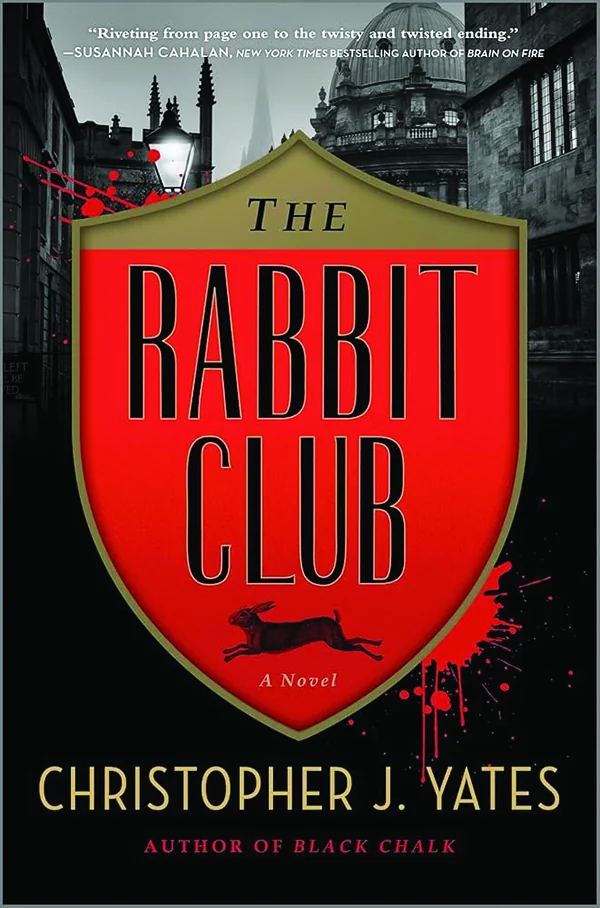The campus novel may have its origins in the early 1950s with Mary McCarthy’s satire The Groves of Academe and Kingsley Amis’s comic caper Lucky Jim, but for many contemporary readers, the genre is best defined by Donna Tartt’s 1992 Gothic murder mystery The Secret History. That book inspired a raft of college-set thrillers, most of them pale imitations, but some inventive variations. Christopher J. Yates’s new novel, which unfolds at Oxford University, is the most recent book to appear in that long shadow cast by Tartt’s bestseller, trying to emerge from it by offering something new.
We know that The Rabbit Club is clearly indebted to The Secret History because, early into his novel, Yates acknowledges the familiar “literary territory” he is mapping. “Obviously we’ve all been here many times before,” a character says. “Academic setting, close group of friends, a tragedy that will tear lives apart.” Several pages later, Yates goes further by having another character hold up the book he is reading. “It’s about these six American Classics students,” he says, “taking some class with a creepy professor. They head into the woods and get up to all sorts.” Yates’s student characters get up to all sorts of things, too, in college and out, and some find themselves engulfed by madness and pushed to the brink of self-destruction. But what prevents the book from being completely derivative is its literary allusions, self-referential flourishes, and tight and tortuous plotting.
Yates’s protagonist is 18-year-old Alistair “Ali” McCain. Born in London but raised by his Texan mother in Los Angeles, Ali returns to his native country in 1994 to study English literature at Cockbayne College, Oxford. There he hopes to devour books, meet kindred spirits, and join an elite dining club, the Saracens. There may also be a chance to reunite with his English father, internationally renowned rock star Gerry, who abandoned Ali when he was 2.

Ali immediately embraces his new surroundings. He is entranced by the college’s centuries-old buildings, quads, cloisters, bell tower, and deer park. He is fascinated by his well-bred roommate, William Wynne-Goode. He strikes up friendships with fellow English students Emma and Victor, with siblings Guy and Izzy, and with future banking baron Thomas de Beaune — T-bone for short. He takes part in a drama contest. To unwind from hours spent in lectures and libraries, he loses himself in a giddy whirl of revelry at parties, balls, and soirées, and in Cockbayne’s Beer Cellar and Oxford’s Churchill Arms.
But Ali’s new life isn’t entirely rosy. A burgeoning romance with Izzy is cryptically cut short. His coursework is critically savaged by Dr. Anton Belsky — “the Beast of Belsky, a tutor who was nothing like a mentoring relative, more like a foe at a strained diplomatic summit.” Things go from bad to worse after Ali tracks down his errant father and gains entry to his grand country home. The pair bond and Ali stays for dinner, only to suffer a near-death experience when Gerry’s wife, Arantxa, serves him soup laced with poisonous mushrooms.
Although it would have been a shock if Ali had made an exit so early in the proceedings, we have come to expect an unhappy outcome for him. Right from the outset, Yates hints that his hero won’t get out unscathed. As the narrative progresses, we sniff more premonitions that suggest the novel is less a story of a young man’s journey through university and more a chronicle of a death foretold. “But while the wisteria’s perfume would linger in Cockbayne until the end of May, Ali sadly would not,” Yates writes. But will his purported plan to kill off his character also kill off any element of surprise?
It is no great spoiler to reveal that Yates has many tricks up his sleeve with which to dazzle us and, crucially, misdirect us. He continues charting Ali’s exploits, and as events turn sinister — friends leave in strange circumstances, a professor is found dead — we stay primed for the character’s fatal misstep. Following an evening of “debauchery and delinquency,” Ali learns that the Saracens are a secret society, and he grows desperate to become a member. “It was like wanting to know the contents of a locked box or what was happening behind the heavy velvet curtain. Perhaps there was something beautiful and better on the inside.” Perhaps, but when Ali is finally invited to join and asked to prove his worth by carrying out a set of dares, or “trials of fortitude,” that involve betraying friends and endangering his life, it becomes apparent that he should be careful what he wishes for.
As with Yates’s debut Black Chalk (2013), The Rabbit Club starts out as a conventional campus novel before gradually twisting and turning into the genre’s murkier, eerier offshoot of dark academia. It is fun to observe Ali as a fish out of water grappling with the codes and traditions of Oxford University, not to mention baffling British lingo, from jacksies and plonkers to jumpers and freshers to spotted dicks and Glasgow kisses. Equally entertaining are the layers of intrigue Yates builds around the Saracens, also known as the Rabbit Club. Ali plays the organization’s fiendish, high-stakes games while solving riddles, discovering the significance of colored ribbons, adhering to a rather unsettling motto — “one learns how to command by learning how to obey” — and familiarizing himself with a hierarchy that goes from new recruit Grey Hares to the all-powerful White Rabbit.
The White Rabbit is one of many references in the novel to Alice’s Adventures in Wonderland. Yates doesn’t stop there. Ali’s adventures in Wonderland also contain frequent nods to Vladimir Nabokov, King Lear, and that other Oxford campus novel, Brideshead Revisited — “a horror story,” Izzy argues. Sometimes, Yates subtly inserts his literary links. At other times, he spells them out for us.
This kind of mixed success manifests itself differently elsewhere. Yates, a British author who lives in New York’s Hudson Valley, studied at Oxford, and as a result, his setting feels authentic. But the same can’t always be said for his characters’ voices, which contain grating signature tics. Victor, the working-class Scot, repeatedly calls people “pal,” a professor constantly addresses the reader as “comrade,” while everyone from barmen to university staff routinely label Ali “young man.” Just as wearying are the overcooked utterances of the high and mighty. “These wretched fruit flies are thirsting after the Pinot Noir one is presently attempting to quaff,” a professor says. Worse is Ali’s upper-crust roommate, who is incapable of asking normal questions. “And which particular model of jet conveyed you here?” William queries. And later, “How far under the influence of Bacchus was the professor?”
Yates may reduce certain characters to caricatures, but he doesn’t diminish any other aspects of his book. As Ali disappears down the rabbit hole into Oxford’s rarefied world, the plot cranks into gear, and the pace doesn’t let up. The pervading sense of mystery intensifies in a second narrative strand featuring an enigmatic figure forced to reckon with “the ghosts of Oxford past.” Just when we think we know what is going on, Yates pulls the rug out from under us. We are left reeling, wondering how a novel so ludicrously far-fetched can also be ridiculously enjoyable.
Malcolm Forbes has written for the Economist, the Wall Street Journal, and the Washington Post. He lives in Edinburgh, Scotland.















